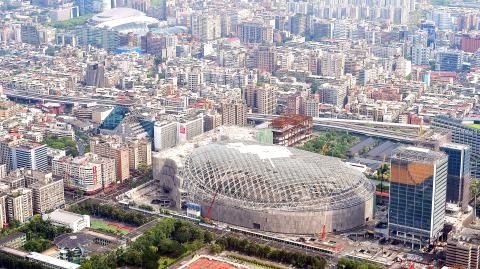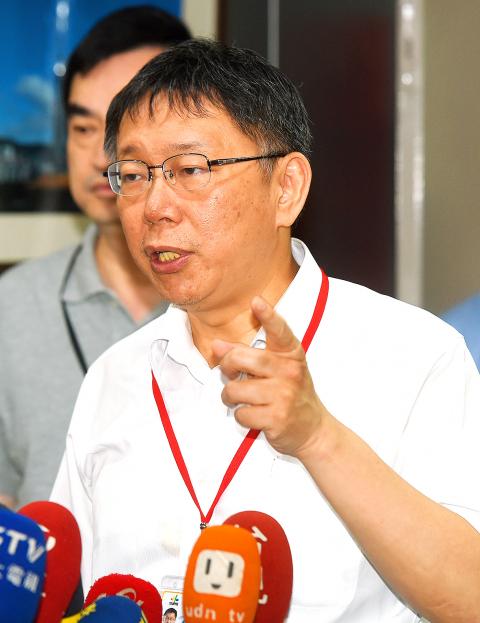The Taipei City Government last night ordered Farglory Land Development Co (遠雄建設) to halt construction of the Taipei Dome, citing concerns about “ongoing damage” to the neighboring Songshan Tobacco Factory and a “threat” to the Taipei MRT Bannan (板南) Line, which runs next to the construction site.
The announcement came less than 10 hours after Taipei Mayor Ko Wen-je (柯文哲) said he felt “the company is too arrogant” and was considering ordering the firm to cease construction until it provides a clear explanation of how it plans to guarantee safety at the site.
Ko said he was “angry” and “could not stand” Farglory’s “insincere” attitude.

Photo: Fang Pin-chao, Taipei Times
The company submitted only a single sheet of paper after being requested to provide a report on improving safety on Monday, even though abnormalities had been found on site since March.
“I feel [Farglory] is irresponsible, because it now says that construction on the foundations [of the Taipei Dome] would be drawn out until August,” Ko said.
The city government agreed to allow construction to continue when safety concerns first emerged on the grounds that the Taipei Dome would be structurally unstable until the foundations were completed.

Photo: Chien Jung-fong, Taipei Times
When asked if halting construction would be dangerous, Ko said that the firm had to provide a clear explanation of how it would address safety issues if construction was allowed to continue.
He added that the safety issues had to be addressed before any discussions took place on contractual issues.
Numerous media reports earlier yesterday said that the city government had reached a preliminary consensus with Farglory in talks on Tuesday between Farglory chairman Chao Teng-hsiung (趙藤雄) and Taipei Deputy Mayor Teng Chia-chi (鄧家基).
The reports said Farglory and the city had agreed to set up a third-party commission to investigate safety at the venue, breaking a standoff over the validity of a city-sponsored probe that called for either the Dome or its neighboring shopping mall to be demolished.
Teng denied the existence of any consensus.
“The city government absolutely did not accept Farglory’s proposals for a third-party evaluation,” he said, adding that Taipei had instead invited Farglory to submit its own plans to improve site safety.
“Without substantial content [regarding improving site safety], calling for a third-party evaluation is simply equivocating,” Teng said.
Farglory also chose to stall on construction safety issues in the hopes that the issue would blow over by the time the site’s foundations were completed, he said, adding that the issue was separate from concerns over the safety of the completed site.
As construction risks could increase with time, Farglory was responsible for giving the city a clear response on the costs and benefits of continued construction, he said.
Ko also said that Chao “reeked of alcohol” when he came in for talks, but added that he himself had not met with Chao.
In a statement, Farglory rejected Ko’s alcohol comment and called on the city to name the person who had given the mayor “mistaken information.”
The firm said the comment was a “groundless accusation” bordering on slander and “public humiliation,” and that it would take legal measures in response.

The CIA has a message for Chinese government officials worried about their place in Chinese President Xi Jinping’s (習近平) government: Come work with us. The agency released two Mandarin-language videos on social media on Thursday inviting disgruntled officials to contact the CIA. The recruitment videos posted on YouTube and X racked up more than 5 million views combined in their first day. The outreach comes as CIA Director John Ratcliffe has vowed to boost the agency’s use of intelligence from human sources and its focus on China, which has recently targeted US officials with its own espionage operations. The videos are “aimed at

STEADFAST FRIEND: The bills encourage increased Taiwan-US engagement and address China’s distortion of UN Resolution 2758 to isolate Taiwan internationally The Presidential Office yesterday thanked the US House of Representatives for unanimously passing two Taiwan-related bills highlighting its solid support for Taiwan’s democracy and global participation, and for deepening bilateral relations. One of the bills, the Taiwan Assurance Implementation Act, requires the US Department of State to periodically review its guidelines for engagement with Taiwan, and report to the US Congress on the guidelines and plans to lift self-imposed limitations on US-Taiwan engagement. The other bill is the Taiwan International Solidarity Act, which clarifies that UN Resolution 2758 does not address the issue of the representation of Taiwan or its people in

US Indo-Pacific Commander Admiral Samuel Paparo on Friday expressed concern over the rate at which China is diversifying its military exercises, the Financial Times (FT) reported on Saturday. “The rates of change on the depth and breadth of their exercises is the one non-linear effect that I’ve seen in the last year that wakes me up at night or keeps me up at night,” Paparo was quoted by FT as saying while attending the annual Sedona Forum at the McCain Institute in Arizona. Paparo also expressed concern over the speed with which China was expanding its military. While the US

SHIFT: Taiwan’s better-than-expected first-quarter GDP and signs of weakness in the US have driven global capital back to emerging markets, the central bank head said The central bank yesterday blamed market speculation for the steep rise in the local currency, and urged exporters and financial institutions to stay calm and stop panic sell-offs to avoid hurting their own profitability. The nation’s top monetary policymaker said that it would step in, if necessary, to maintain order and stability in the foreign exchange market. The remarks came as the NT dollar yesterday closed up NT$0.919 to NT$30.145 against the US dollar in Taipei trading, after rising as high as NT$29.59 in intraday trading. The local currency has surged 5.85 percent against the greenback over the past two sessions, central